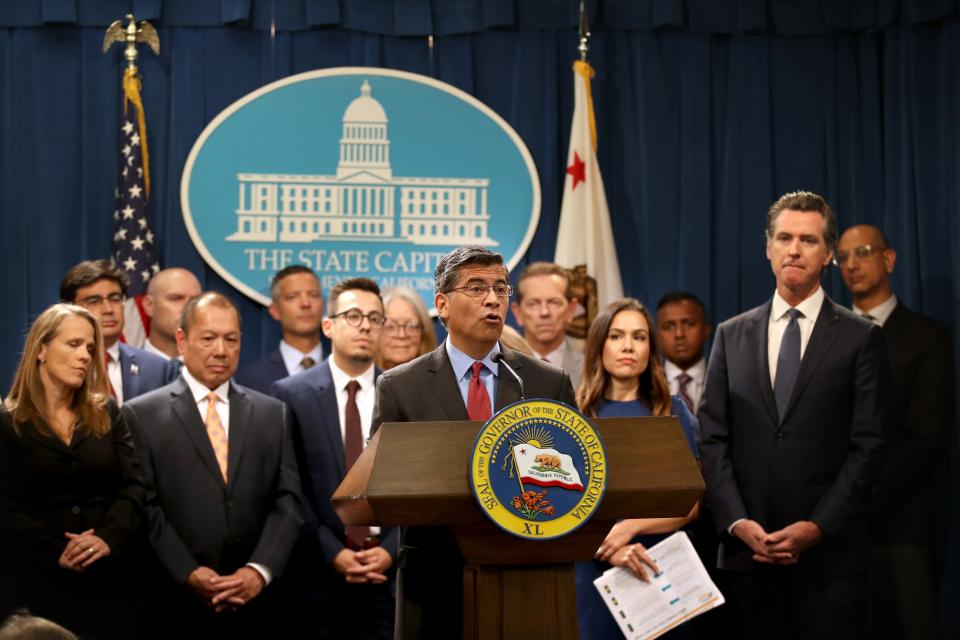The left is abandoning consensus that immigrants are not entitled to public welfare
Hard to fathom at present, but there was once a time in this country in which there was a general consensus about some aspects of immigration policy.
One of them was that immigrants were welcome, provided they earned their own way. Taxpayers shouldn’t have to support them through our safety-net welfare programs.
Even that consensus appears to be fracturing.
The former consensus is embodied in our laws in various ways.
Generally, immigrants aren’t eligible for federal safety-net welfare programs. Permanent legal residents are eligible for many of them, but only after a five-year waiting period.
Immigrants who become citizens are, of course, fully eligible, just like any other citizen. Becoming a citizen is an act of fully joining our polity, including access to the programs that have been enacted to provide common provision.
Video: Immigrants Have These Rights When ICE Approaches
It's an old rule barring benefits
For well over a hundred years, our immigration laws have prohibited entry into the country of those are likely to become a “public charge,” or be dependent on safety-net welfare programs.

This hasn’t keep low-income or low-skilled individuals from immigrating. But they needed sponsors who assumed financial responsibility for their transition. This usually was family members or charitable organizations, such as churches.
“Public charge,” however, isn’t defined in statute. Regulations limited the evaluation to cash-assistance programs, such as Temporary Assistance for Needy Families (TANF).
The Trump administration recently adopted a rule expanding the evaluation to other low-income assistance programs, such as Medicaid, food stamps and housing vouchers.
Cue the outrage.
Rule expansion won't have much effect
The expansion has been denounced as cruel, inhumane and, of course, racist.
In the age of Trump, overreaction has become the norm. In reality, however, the expansion makes sense and won’t have much of an effect.
Trump's rhetoric: Trump won't stop his racially charged rhetoric. The repetition is what makes it work.
If the policy is that immigrants should make their own way and not rely on taxpayer-funded welfare programs, getting a TANF debit card is indistinguishable from getting a food stamps debit card. And how is having taxpayers pick up the tab for your health care not being a “public charge”?
Since immigrants aren’t eligible for most welfare benefits anyway, the biggest practical change would be to give greater scrutiny to the commitments that sponsors make to provide assistance during the transition to life in the United States. But even that assumes the frontline bureaucrats who process these applications will pay a whit of attention to the change.
Nevertheless, states with Democratic attorneys general, led by California, are filing yet another lawsuit to stop implementation of the new public charge regulation.
States have enacted their own rules
Given that the change doesn’t amount to much, it’s fair to assume that it’s mostly a symbolic gesture to show President Trump’s base that he’s tough on immigration. And the overreaction, it’s fair to assume, is partially a result of the generally toxic environment Trump has created regarding immigration policy.

However, there is clearly more than that going on. Democrats and liberals are abandoning the consensus that immigrants should make their own way and not rely on taxpayer-funded safety-net welfare programs heretofore generally reserved for citizens, full participants in our polity.
States can choose to make immigrants eligible for some federal safety-net programs, and many have. And in some cases, even if the immigrant isn’t here legally.
California has made illegal immigrants under the age of 18 eligible for Medicaid. It recently expanded that to include adults up to the age of 25.
Debate on immigration to get toxic
At a recent debate of Democratic candidates for president, the question was asked whether their health care plan would include illegal immigrants. All 10 participating raised their hands, indicating that it would.
We can debate whether the United States should have more or less legal immigration, how we can reduce the incidence of illegal immigration, and what to do with the illegal immigrants who have established settled lives here.
Immigration in the 2020 election: Democrats can turn immigration into a total loser for Donald Trump in 2020 — if they dare
But if the United States abandons the principle that immigrants should make their own way and not rely on taxpayer-funded welfare programs, that would fundamentally and profoundly alter our relationship with those born in other countries and what admission into our country means. And it would make the debate over those other immigration issues even more toxic than it already is.
In announcing the lawsuit against the new public charge regulation, California Gov. Gavin Newsom superciliously said he was defending the Statue of Liberty.
Someone should tell him that at the time those words were inscribed, there were no large-scale federal safety-net welfare programs. Those huddled masses made their own way, relying on family members or private charity if they needed a helping hand. Breathing free is all they sought.
Robert Robb is a columnist for the Arizona Republic, where this column originally appeared. Follow him on Twitter: @RJRobb
You can read diverse opinions from our Board of Contributors and other writers on the Opinion front page, on Twitter @usatodayopinion and in our daily Opinion newsletter. To respond to a column, submit a comment to letters@usatoday.com.
This article originally appeared on Arizona Republic: Immigrants on welfare: Democrats ditch consensus on public assistance

